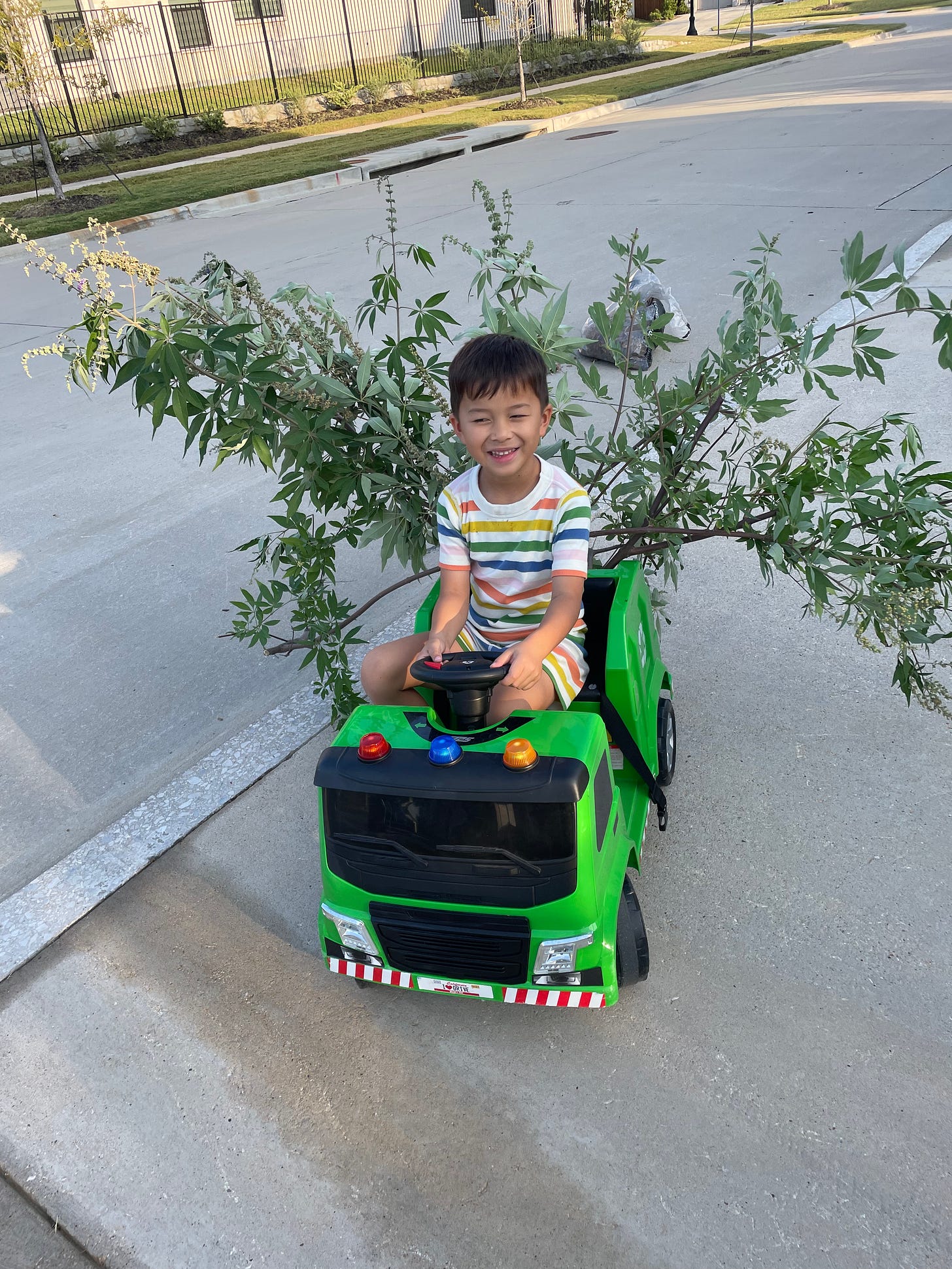Recycling Truck Commute
An underrated life skill is knowing when to stop and make a decision or accept an outcome. I’m not sure if it’s even rated at all. The only lesson I ever got was from my father-in-law a few Christmases ago as he watched my O.C.D. in action overtightening a screw while assembling a motorized recycling truck my now-6-year-old refuses to age out of, which confirms he doesn’t care about getting laid yet.
The screw wasn’t going anywhere, my father-in-law said, and he proved correct. Perhaps he meant it as a coaching metaphor, the crafty Stanford graduate. They teach you about the law of diminishing marginal returns in Econ 101 but leave you to intuition to figure out practical applications and how marginal is too marginal in real life.
Some people are great at it. They just know — when to leave a party, stop eating, choose a product, concede to the insurance company, give up on squeezing out the last bit of toothpaste or sunscreen, avoid a rabbit hole at work that leads to no business impact.
I tend to overdo and overthink. While trying to scrub out discoloration on a bathtub, I couldn’t gauge reasonable intensity or duration and ended up scratching through the surface. I have to set arbitrary page limits when researching Amazon purchases; thus infinite scroll has not been a friend.
During my first two weeks since Covid as a commuter, my routine has been to refresh Google Maps no fewer than five times in the first 2.3 miles, toggling the Avoid Tolls feature until deciding just before the point of no return whether to get on the tollway for 4.9 miles. And then keeping a Piper-worthy side-eye on the road not taken to see if the grass is greener.
Two roads diverged in a wood, and I—
I took the one less traveled by,
And that has made all the difference.
-Robert Frost on traffic
Deciding to accept this hybrid office position over another offer and pending interviews should have been straightforward. My brother, who started his new job the same day as me this month, is an example of nature trumping nurture. He is simply wired differently. He got his offer and gleefully canceled his other interviews. He later received an interview request from Dr. Pepper, a legendary brand in our hometown, that caused momentary F.O.M.O. And then he let it go.
I, on the other hand, kept a few interviews as backups and opportunities to make connections. (They didn’t need to know my mind was made up. Undoubtedly I’ve interviewed with employers that had already decided on other candidates.) I was even tempted by interview invitations that came in after I already started, reasoning it couldn’t hurt to learn, practice, network and have a contingency plan after hearing a comment from a colleague the other day about the importance of firing quickly.
It’s hard for me to know when to stop just about anything because of my unshakeable feeling that a) moderation takes away from closure and b) I can influence and optimize outcomes. The latter generally is considered a good trait. Having an internal locus of control tends to be coupled with better mental health. But as I remember from an exercise called “balcony-basement” at a new-hire orientation seven years and four jobs ago, every strength can be a weakness.
I got fired from that job, which most would consider a hard stop, and then emailed the C.E.O. asking to rejoin as an intern on a different career path. I just always feel like there is a way out, a way to salvage or improve or streamline. Charitably you could call this growth mindset, and my interpretation of it has come up in many arguments with my wife, some of which were shared on this blog.
Here’s a hard pivot to the sappy but true. You would guess big decisions command so much analysis and second-guessing from me that I can’t even make them. Well there is arguably no bigger decision in life than whom you want to spend it with.
I don’t even know how to describe how easy it was to decide to propose to my wife 10 years ago. No consulting with anyone, weighing opportunity costs, trying to predict the future or time the life markets. It was less of a decision than a recognition of what was happening.
If you know my wife, you understand how this was and will be my best decision ever. She is my ultimate outlier in what feels like a spotty record around traditionally important choices, from college majors and careers, to jobs and companies within those careers, to stock picks and housing market navigation. The one I didn’t think about pays off every day in the form of a partner who admittedly indulges my idiosyncrasies a bit much, but out of love and acceptance. That helps keep a few screws loose in my head.
